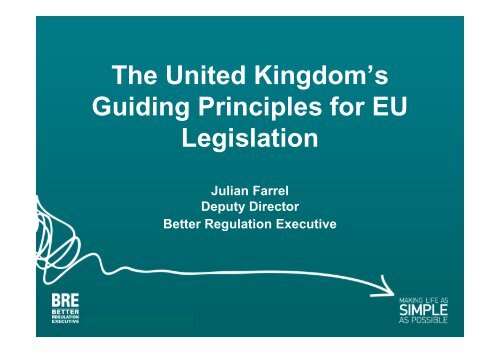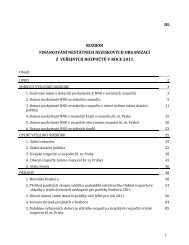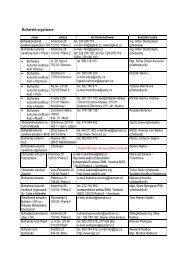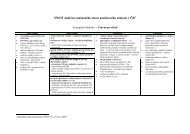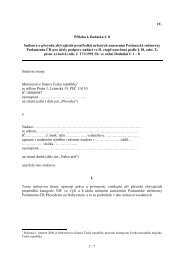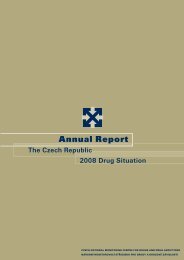Julian Farrel
Julian Farrel
Julian Farrel
- No tags were found...
You also want an ePaper? Increase the reach of your titles
YUMPU automatically turns print PDFs into web optimized ePapers that Google loves.
The United Kingdom’sGuiding Principles for EULegislation<strong>Julian</strong> <strong>Farrel</strong>Deputy DirectorBetter Regulation Executive
So what does this mean?• Guiding Principles comprise:– General Principles– Operating Principles• From Early Engagement, via EU influencing, to Transposition• The Principles establish how we tackle the flow of EUlegislation from conception to implementation– Concept– Proposal– Negotiation– Adoption– Publication– Transposition– Implementation– Review
General Principles: Government’s Approach• The Government's approach is:– to look at the cumulative impact of new EU measures– wherever possible, argue for alternatives to regulation atEuropean level– to engage with the European Commission before it hasadopted proposals to increase UK influence– to build alliances with other MSs, MEPs and other EU-levelstakeholders to increase the UK’s effectiveness in negotiation
General Principles: Ministerial Commitments• Ministers must ensure that:– They are sighted on all EU measures in their Departmentfrom proposal to transposition/implementation– Their Departments assess from the outset• the impact on the UK, and• effectively project manage from negotiation totransposition
Guiding Principles: Early Influencing andEngagement• Twice a year, Ministers report to the Foreign Secretary on theirDepartment’s early influencing priorities and engagementstrategies:– to influence the Commission’s policy agenda and ensurefuture EU measures are justified;– to ensure that proposals which cannot be achieved throughnon-regulatory means are drafted to maximise benefitsand minimise risks to the UK.• Cabinet Committee can then agree cross-Government earlyinfluencing priorities
Guiding Principles: Early Influencing andEngagement• Departments will seek clearance for their proposed UKnegotiating position promptly– analysing the order of magnitude of likely impacts of options tohelp Ministers make evidence-based decisions;– analysis should be proportionate to the proposal and timeavailable, and presented succinctly.• The Government will work with EU partners to hold the EUinstitutions to account on the commitments made on– consultation– impact assessment– the ‘think small first’ principle– reviews in order to improve the quality of EU regulation
Guiding Principles: Approach toTranspositionMinisters must inform Cabinet Committee of their approach totransposition/implementation within two weeks of an EUmeasure appearing in the Official Journal of the EuropeanUnion – satisfy the Committee:– that they have identified the aims of the EU law andthe relevant policies of the UK Government– how the two will be brought into harmony so thattransposition neither has unintended consequences inthe UK nor risks infraction
Guiding Principles: Approach toTranspositionTransposition Principles addressed twice during policy development cycle:– ‘Pre-consultation’ Cabinet Committee Clearance– ‘Final Stage’ Cabinet Committee ClearancePrinciple 5 – When transposing EU law, the Government will:a) wherever possible, seek to implement through the use of alternativesto regulationb) endeavour to ensure that UK businesses are not put at a competitivedisadvantage compared with their European counterpartsc) use copy out for transposition where it is available, except where doingso would adversely affect UK interests – if not used, need to explain toCabinet Committee the reasons for their choiced) necessary implementing measures come into force on (not before)the transposition deadline, unless there are compelling reasonse) include a statutory duty for Ministerial review every five years
‘Gold-plating’What is ‘gold-plating’?Principle 5 b) “endeavour to ensure that UK businesses are not putat a competitive disadvantage compared with their Europeancounterparts”
So what is ‘Gold-plating’?• ‘Gold-plating’ is when implementation goes beyond theminimum necessary to comply with a Directive:– extending the scope• adding in some way to the substantive requirement, or• substituting wider UK legal terms for those used in the Directive– not taking full advantage of any derogations which keeprequirements to a minimum– retaining pre-existing UK standards where they are higher thanthose required by the Directive– implementing early, before the date given in the DirectiveSource: UK Government Transposition Guidance
Sources of Guidance• Guiding Principles for EU legislation• Transposition Guidancewww.bis.gov.uk/policies/bre/improving-eu-regulation/guidingprinciples-eu-legislationwww.bis.gov.uk/assets/biscore/better-regulation/docs/t/11-775-transposition-guidance.pdf• Better Regulation Executive (BRE) websitewww.bis.gov.uk/bre• Red Tape Challengewww.redtapechallenge.cabinetoffice.gov.uk
Contact Details<strong>Julian</strong> <strong>Farrel</strong>Deputy DirectorBetter Regulation ExecutiveDepartment for Business, Innovation and Skillsjulian.farrel@bis.gsi.gov.uk


